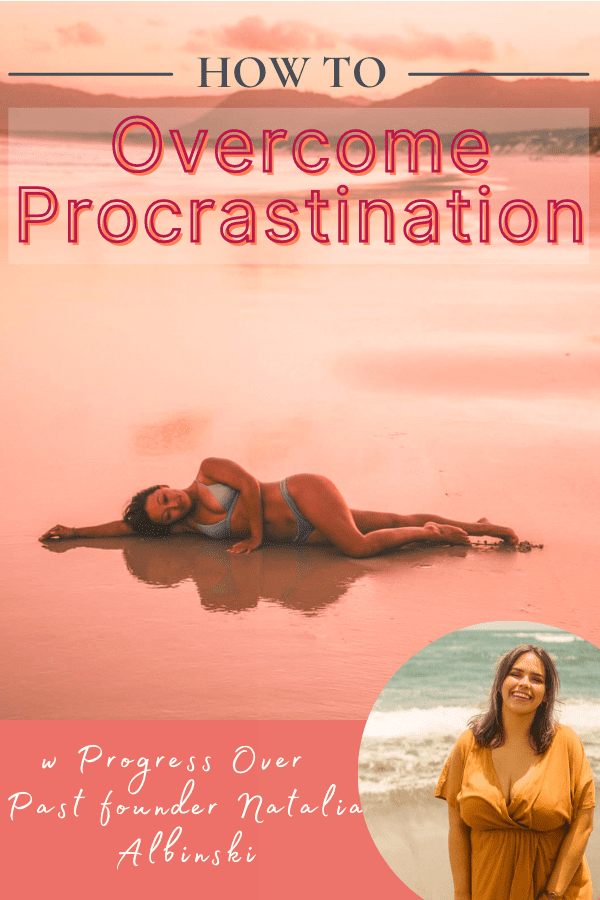Have you ever thought…’What if I had started straight away?’ It’s easy in theory but harder in practice, especially if you are a procrastinator. So this week I talk with procrastination coach about how you can overcome procrastination and better pursue your goals and dream life.
Connect with Natalia on Instagram
Quick Links
✧ Join The Wanderlover Coaching Group
✧ Download Your FREE 0 to $100K Game Plan

Prefer to read? Here’s the blog version…
Dani:
We have a procrastination coach on the show today. Natalia Albinski is the founder of Progress over Past and she helps procrastinators get unstuck and smash goals. She is also a graduate of Momentum Mastermind who quit her job this year and now grows her business while traveling full time around the world. Warmest, welcome to the podcast. Natalia.
Natalia:
Thank you so much for having me. I’m so excited to be here.
Dani:
I’m so excited to dive into the topic of procrastination because I have a feeling I’m not the only procrastinator here. Do you feel that way? Like you attract procrastinators into your community?
Natalia:
Yes, definitely. I honestly, I feel like almost every person has struggled with procrastination at some point in their life. I, since I’ve started this business and have been talking to people, almost every person I’ve talked to has resonated with the message of overcoming procrastination or time management because you know, it’s something that’s not taught to us in schools or by our families. Yeah, usually. And so, but it’s something that all of us struggle with, but no one has really learned how to o overcome. And so it’s, to me, there’s just such a huge gap in knowledge and resources because it’s something that so many people struggle with.
The Emotions Behind Procrastination
Dani:
In your experience, what does procrastination look like in your case and maybe some of your clients different examples of procrastination?
Natalia:
Yeah, I think procrastination, mostly what people don’t really understand until they learn more about it is an emotional regulation issue. The thing about procrastination, I think a lot of people feel that procrastination is something inherently wrong with them, or maybe they’re lacking the motivation, but usually we’re procrastinating because we’re avoiding some sort of negative emotion. And so there’s usually something about whatever task or project or goal that they’re procrastinating that is bringing up some sort of negative emotion for them, whether that’s anxiety or fear or worry about disappointing someone else, something along those lines.
Natalia:
And so that’s one of the core pillars of my business, is to get behind that emotion behind procrastination, because I feel that I can teach all the productivity tips in the world, but it’s not gonna help unless we get to the bottom of what’s happening emotionally, of why we’re procrastinating.
The Pillars of Procrastination
Dani:
That is so interesting. So what are the other pillars?
Natalia:
So yeah, that’s my, honestly, I feel like that’s one of my main pillars is to help us understand what’s going on. And I really wanna take that from a lens of self love too, because I want my clients to understand what emotions they’re avoiding and what emotions are coming up when they’re procrastination, when they’re procrastinating through this lens of self-love. Because I think that if we don’t love ourselves inherently, if we don’t see ourselves in a positive light, then we’re going to keep repeating the same self-destructive patterns. Yeah. You know, and I think that for me, in my own history with procrastination, because I always considered myself just a serial procrastinator my entire life, I always struggled in school.
Natalia:
I always struggled with deadlines. It just, it was something that would haunt me in every facet of my life. And I didn’t start to see a change until I worked on my internal world, until I started journaling, until I started using affirmations, until I went to therapy, until I really started to believe in myself so I could believe that I could make a change and and create a life that was, was better, a life that I deserved. Because if you don’t think you deserve happiness, yeah, then you’re gonna keep repeating those cycles. So that’s a huge pillar is, is understanding ourselves through self-love.
Natalia:
And my other primary pillar is through learning what I call gentle systems. And so for me, I think that of course, as I said, as I’ve been saying, that you know, we have to understand the root of our procrastination, but also we can’t just rely on willpower every day. I think that’s something in the procrastination sphere that I really hate seeing on like these videos on TikTok that are very masculine energy of you wake up every day and you just have to grind. And if you don’t have the motivation, find it.
Natalia:
You know, I think that that is so toxic, at least for me, at a lot of the people that I work with, especially for women. You know, our, our energy levels rise and fall throughout the month from day to day. And I think that we’re only as good as our systems. And so what’s your system of your habits that you do every day? What’s the system of your project manager? Task manager, and I really like to relate to my clients that, that this doesn’t have to be strict. It can be gentle, it can be you wake up and you have different choices of what you want to do based on your energy level or that you have, you have this habit that you’re gonna stick to every day, but maybe you wake up one day and you’re not feeling it.
Natalia:
And so you can do something else that’s a little more gentle or that, you know, I think for me, giving 100% every day is giving whatever percentage you’re able to give. So if you’re best is 40% that day, then giving 40% is your 100%. If your best is 10%, then giving 10% is your 100%. You know, we don’t have to be at this high. I really wanna step away from this, you know, super high level or our entrepreneurs and we have to be at operating at the super high level every single day because at least for me and my fellow female friends, mostly, I think it’s unrealistic.
Natalia:
And so that’s why I like to call my systems gentle because I wanna work with you and with your rise and falls of energy instead of against you and just create this expectation.
Dani:
I love that. And it sounds like you have this holistic system to overcome procrastination and it’s not just a simple band-aid solution, right? It’s ultimately changing your lifestyle and what you do. Yeah. Like on a weekly, monthly basis, not just, you know, you wake up and be productive and there’s that. Right. Right. And so I’m curious, let’s bring it back to your history with procrastination, cuz you did mention you always considered yourself a serial procrastinator and maybe there’s people listening right now who would also consider themselves a serial procrastinator.
Natalia’s Experience with Procrastination
Dani: What was the turning point for you when you were like, this has to change, like I need to do something about it instead of just repeating the habits you developed what seems like for a lifetime.
Natalia:
For a lifetime, yeah. And it, it is very hard to break habits that you’ve had for a lifetime. But yeah, the, that’s a great question. When I came to a point a couple years after, a few years after I graduated from college where I had these goals that I just was not realizing, I had, for example, I had a goal of becoming a substitute teacher. And I had had that goal for almost two years at that point, and I just wasn’t getting there. I couldn’t get myself to submit the application.
Natalia:
And then finally I submitted the application and then I got it and then I had another goal of teaching English abroad in South Korea. And then that also took me another two years to accomplish. And throughout those few years it was, for me, it was really tough because I would tell the people in my life that I had these goals. And so then the next time that I would hang out with them, they would ask me, oh, so how are things going for teaching in South Korea? And every time I would see them, I would have to say, oh, nothing, you know, I haven’t, I haven’t done anything.
Natalia:
I literally haven’t done anything. And then it just created this cycle of shame that, that I carried with me throughout the week. And the whole week I would, I, this goal seemed so lofty, I didn’t even know where to begin. And so I just wouldn’t do anything. And then I would see somebody and they would ask me about it and then my confidence would dive deeper into the trenches and it would, and it, and then it would just happen. It was the cycle of happening over and over again. And, and so that’s really when I realized, it was during that time that I realized, I was like, I have lived my entire life like this.
Natalia:
I have been really comfortable in mediocrity honestly my entire life because I’ve just, I’ve never felt what it feels like to accomplish a goal on time or even just maybe accomplish a goal at all. And, and I’ve been living in this constant fight or flight of stress, of waiting till the last minute and all these emotions. And I was just like, I just need, I’m never, I felt like I was wasting my entire twenties, you know, I was watching my friends do things and accomplished things and go to grad school and do all these things.
Natalia:
And I had these goals myself too. And I was just, I felt like I was just sitting wasting away my twenties just doing absolutely nothing. And so I was, that’s when I realized I really needed to make a change. And so then I started therapy and that was huge for me because it, it was in therapy when I realized that I had these self-destructive patterns and that I wasn’t, I didn’t have enough self-love to be able to make better choices for myself because I didn’t think that I deserved to live a happy life, honestly. And, but then also through therapy I realized, well, therapy is great and it’s helping me with this emotional side, but I’m not getting as much practical knowledge of how to overcome, you know, how to start habits, good habits or how to manage a project or manage a goal or things like that.
Natalia:
Because I was only seeing my therapist once a week and we could really dive into the emotional stuff, but I felt like I needed extra support. Right. You know, with the S throughout the, exactly. And so that’s when I started learning things on my own as well. And so pretty much for the past about five, six years, I’ve been dedicating my time to understand time management, productivity, procrastination. And that’s also I think back to my time in therapy. And that’s why I, that’s what helped me develop my modality for coaching of accountability because I have, my clients have access to me five days a week and we have as many as four check-ins per week on the phone.
Natalia:
Cause for me, I felt like therapy was great, but I would have really positive therapy session on a Tuesday. And then by Friday I was just back, you know, I was just back to my, to my old ways. You know, I would have maybe one day of motivation after. And so I think that especially when you’re just starting out, having constant accountability works best because you need that, that little boost of, of motivation and support every day, honestly when you’re first starting out. Because making these changes feel so foreign and it feels so uncomfortable. And you have to really essentially grieve your old self.
Natalia:
I think that’s a part of this journey that I didn’t know was coming was that I had to accept this, that I’m gonna change as a person and I have to let my old self go that old self that’s comfortable with mediocrity, that leaves everything to the last minute that repeats these cycles of self destruction. I had to leave that person behind. And that’s really intense. And so there’s a lot that goes into it. And so I think especially at the beginning, people need a lot of support. So that’s what I help my clients through.
Dani:
I love that. And what’s fascinating is you saw a better, more rewarding life. You were in that self destructive cycle, but it took this leap of faith to be like, Hey, like I want to change my ways. There is a better reality for me. And you made that happen. So you took action and found the support and did your research to create this beautiful new life for yourself. So I think that’s the first thing to realize, like if you’re stuck in that pattern, you have the power to change if you really wanted to. Right. So first being able to see that. And then the other thing is, when you were in these self-destructive cycles of shame, of guilt, what you can now reflect on is they were mostly like self-imposed. Right. And a lot of it being habitual, you almost feel comfortable in that. In those feelings.
Natalia:
Yeah.
Dani:
And so that’s why it’s going to be this huge shift. It’s not gonna be comfortable in the beginning, but having you as a mentor and being able to see three months out, six months out, one year out, and you being a prime example of how your life can change when you start doing the uncomfortable things, you can slowly create this new reality and you sink into it and you revel in it and it’s just magical how different your life can look.
Natalia:
Definitely. Definitely. Yeah. It’s so comfortable. Bad habits are comfortable, you know, if you’re, if you’ve been doing something for years, that’s your comfort zone. And it takes a lot of courage to get out of that. And, and I, and I hope to remind people that courage is not the absence of fear. It’s having fear and, and doing it anyway. And so it can see really scary to choose a different path for yourself and choose to make a change. But 100% it’s possible. Something that I hear all the time when I talk to people who haven’t started this work is they just feel that they are a procrastinator and that’s their title.
Natalia:
Yeah. You know,
Dani:
Identify it.
Natalia:
Yeah, exactly. That’s their, that’s their identity. And I try to tell them, no procrastination or, or overcoming procrastination is a skill that anybody can learn. Unfortunately it wasn’t taught to us in school, but 100%. It’s something that you can learn and you can overcome. It’s not something that will have to plague you for the rest of your life. You don’t have to live in this stress and shame and guilt for the rest of your life. Yeah. You can, you can make that change.
Why we procrastinate
I know you talked about this in the beginning of the episode, but, and I also saw it in your stories, but can you go in a little more detail why we procrastinate? So you said a lot of times it’s tied to an emotion. Can you elaborate on that?
Natalia:
Yeah, so usually we are avoiding some sort of negative emotion when we are procrastinating a task. And so it can be a pretty deep emotion. Like you can have a deep fear, for example, if, if it’s some big project at work and you know, a lot is writing on you to complete this project at work, you can have a deep seated fear that you are not gonna, you’re not going to accomplish it in the best way or your work is not going to be good enough. And so you’re afraid of shame and you’re afraid of criticism and you know, so that could be a deep fear or it could be a little more surface level like, you know, maybe you have to do the dishes and that just sounds really boring, you know?
Natalia:
Yeah. And you wanna avoid that negative emotion of, of being bored and, and anywhere in between. And so in terms of why we procrastinate, I think almost any time if somebody is procrastinating some sort of task, whether it’s big or big small task or a big goal, if you really take the time to reflect on it, you can get to the bottom of what emotion am I avoiding and why
Dani:
That’s so fascinating for me personally, when I reflect back on times I have procrastinated, cuz I’ve done this in like high school throughout college, it’s always, I feel like I’m the most efficient. Like the night before an exam when I’m like, I only have this amount of time to accomplish this or finish this task. Like that’s when my mind, my body, my spirit, it’s all aligned to finish that task. Cuz I, you know, give myself that deadline. And it’s almost like performing under pressure. So maybe that’s like the real emotion of it, right? Yeah. But it’s cool how it all comes back to like this emotion that you are trying to chase or run away from.
Natalia:
Yeah. And some people do work better under pressure. There was actually a study that came out that showed that some people actually do perform their best work under pressure. You know, some people don’t and some people do. And so I, what I hope to communicate with people is, is when you’re taking this journey of overcoming procrastination, I I don’t want it to seem like a journey of completely changing yourself to mold into what you think productivity is. You know, I wanna take what, what you, what already works for you and use that to empower yourself to, to make better decisions and, and create better habits.
Natalia:
So for example, you know, if I have a client like you that says they work best under pressure, then great, let’s harness that. Give yourself those deadlines. Yeah. Put a timer on. I don’t, I don’t want anybody to think that something’s, you know, something they’re doing is inherently something that’s wrong with them. Let’s harness that. They’re, I’ve, I’ve talked to a good amount of people that are like, oh, it’s so bad that I leave everything to the last minute. But I’m like, okay, well why do you do that then? Let’s, you know you work better under pressure then cool. That’s just information about yourself. Yeah. That’s not something that’s necessarily bad.
How to overcome procrastination
Dani:
That is such a great answer to what I was gonna ask you next. Like how to overcome, how do you overcome procrastination? And there’s no blanket statement to that. Like similar to why there’s no one reason why people procrastinate. It’s really, and it sounds like your approach is really curated to each individual, really understanding holistically what they’re going through and what their personality is, what their habits are, and then forming this new habit or this new routine that works best with whatever it is that they’re trying to accomplish. And that’s most aligned with their personality.
Natalia:
Yes, 100%. I, I would say, if I could make any blanket statement about how to overcome procrastination, it would be to learn how to manipulate your own dopamine in your brain. Because the, the biggest way that humans are motivated is dopamine. And so there’s actually this study that was done on rats where they eliminated their dopamine completely and these rats died. Cause they had no motivation to, they had no motivation to eat, they had no motivation to drink water, they had no motivation to move.
Natalia:
And so they just, they, they had not of motivation to even just take basic care of themselves. So they died. And so what we wanna do with wow with humans is, is understand how important dopamine is for that reward center and that motivation center and think about what makes you excited to do a task or some sort of work. So, you know, for example, some person might be a really soft, quiet person and they work best in, in an environment that’s really cozy and really quiet and that makes them excited to get some work done. And so great, you know, that’s what makes, that’s what sparks your dopamine.
Natalia:
And so let’s put you in this environment, but someone else might be really high energy and to get a task done, they need to, you know, put on headphones and blast
Dani:
Some blast Metallica, which is what Ragz does.
Natalia:
Upbeat Yeah, exactly. Yeah. Blast some upbeat music or put themselves in a social environment that gives them energy because they get, you know, they get dopamine from social interactions. And so, you know, and you can, you can, what I, what I want to help people do is, is manipulate their environment to, to be the best possible environment for them to be motivated to get something done. Because if we leave everything up to ourselves and our own willpower, we’re gonna fail. I would say probably at least 95% of the time because not many people just wake up with just like, I just wanna get everything done.
Natalia:
Maybe you have that day once a week or something. But you know, not everybody is just gonna wake up every day. And so we need to really understand what triggers our dopamine and how can we harness that to complete our task while making ourselves happy.
Dani:
Yeah. And that’s really exciting because it’s almost like you’re asking yourself, how do I make a boring task or any task, you know, how do I make it the most fun for myself? Yes. And changing my environment to make it like the super fun, exciting task, which is kind of fun if you think about it that way. You know, you, you have the power to just like change every little thing that you do to have a dance party or like do this and think about it differently so that it doesn’t have to just be I have to do the dishes.
Natalia:
Right, exactly. I think if we look at doing work or any task as a punishment, we’re not gonna do it. Exactly. You know? Yeah. It’s like, oh, I have to do my dishes because being an adult just sucks. And I just have to, you know, this is just what comes from being adult. No, you, there’s ways to make it fun. You, you, you can make your life as exciting as you want and the more enticing you make those things, the more dopamine is going to be released in anticipation for doing the task, which will get you up, which will stop you from procrastinating the task.
Dani:
Yeah, for sure. And I think there’s also something to be said about reframing the task. So instead of a punishment, seeing it as a reward or even something like
Natalia:
Exactly
Dani:
Paying your expenses, paying your bills. It doesn’t have to be this thing you dread. It could literally be, I’m so grateful to be paying these because it enables the lifestyle that I’m living. Your cell phone bill enables me to communicate with my friends and family. So having that awareness that you’re able to reframe things and shift things into a different perspective, that’s so helpful.
Natalia:
Exactly. It’s, it’s really all about mindset and positive psychology because yeah, I just, as I said back to the beginning, I just, I hate when I see these videos of like, you don’t wanna do it, do it anyway. Just do it. Wake up at five and like work for an hour. I know, maybe that works for some people and they go to the military and, and that kinda mentality works for them. But I dunno.
Dani:
No, it’s very masculine driven.
Natalia:
Yeah, exactly. I, I wanna, I wanna live my soft, gentle life of doing things on my terms and doing things that make me happy and figuring out how I can incorporate happiness and ease into my lifestyle.
Life after overcoming procrastination
Dani:
Yeah. I’d love for you to paint a picture. What does your life look like now after you’ve incorporated these changes and how has your life changed from you years ago to where you are now?
Natalia:
Yeah, the biggest change has been habits. Habits and systems, which has been really hard for me because I also have adhd and so I’m very scatterbrained and you know, I also, just as a personality trait, I really hate structure and consistency. And so I was very averse to habits for a long time because for me, I saw them as something that was constricting me. Right. But I’ve really, in the past few years, shifted my view to look at consistency and habits as giving myself power and freedom. That it’s not a way to constrict my lifestyle.
Natalia:
It’s actually a way to liberate it. And so the biggest change has been habits, number one. The, the way that I started this whole journey was to start doing just one thing in the morning that like gets me up and gets me moving and, you know, gets me in that mind of, of self love and productivity. Because actually the way that our brain receives dopamine first thing in the morning is the way that our brain will wanna continue to receive dopamine throughout the day. And so if the first thing that we do is scroll on TikTok, then that’s the way, that’s our brain getting dopamine.
Natalia:
And that’s, we’re gonna just be wanting to look at our phones for the rest of the day.
Dani:
Oh, interesting.
Natalia:
I didn’t know that. Yeah. But if the, if the first thing you do in the morning is read some affirmations or get up and stretch or get up and go on a walk or something along those lines, you’re signaling to the brain, oh, I just got dopamine from doing this, this thing, this habit that’s helping me take care of my body and my and my mind. I’m gonna want, we wanna do this for the rest of the day. And so that really sets you up for success. That’s really what I point to people of doing first is just starting with one thing in the morning. And so in terms of my life now, I have a more in depth morning routine, but it’s, it’s taken years to work up to this.
Natalia:
I really try to tell people that you’re not gonna go from doing nothing for yourself to having this one hour long morning routine where you wake up and you go on a walk and you stretch and you meditate and you read five affirmation, you know, that’s just gonna be too much. And so it’s a gradual buildup. And so I think the biggest difference for me is, is my morning routine and also having system, my task manager, which I have on a software called Notion where I put in all my task. And one of the biggest aspects of my task manager that I love is that I sort by the task energy level Okay.
Natalia:
That it’ll take to, to do that task. And so if I wake, yeah. And so if I wake up one morning and I just feel, you know, maybe I didn’t get a lot of sleep or something like that, and I just feel really low energy and I don’t expect myself to do the highest energy task cause then I’m just gonna do nothing, you know? And so I give myself the option of like, oh, I can sort by these tasks that are all pretty low energy things that I can just do from bed and then it helps me just get at least something done. And so for me, yeah, the biggest two things have been habits and also getting a task manager that allows me to go through my own waves of energy levels.
Natalia:
Because I think at the beginning when I first started this, I really was in the mentality of I made the plan to do this today, so I have to do this today. And then that just wasn’t working. So I’m giving myself the flexibility to choose has been huge just for
Dani:
Me. Yeah. And first and foremost, having the desire to change, right. And then really putting in the time and effort to change those habits which result in massive life changes. So even for you from not accomplishing things like spending two years to apply for something to going abroad, teaching English abroad, moving abroad, starting your business. So all of these, they lead up to those massive life changes that help you reach your goals.
Natalia:
Yeah, exactly. It’s, it’s one step at a time. And something, something that I do as well is, is I have my three top five year goals and I write them down every single morning and then I write just three steps for what I can do to meet those goals today just to get me one inch closer. Yeah. Because it’s, it’s this, you know, when we look at things in too much of a, in too big of a lens, they’re gonna seem overwhelming. And so the big change starts with the small steps. And so that’s been huge in my, in my life too, of just knowing that I’m just gonna take one small step today that’s gonna get me to the next level.
Natalia:
And then, yeah, now I’m here as an entrepreneur with my own business living abroad. And I, you know, sometimes I’m like, I can’t believe I got here, but I’m like, no, I know how I got here. Gots and steps and my systems. Yeah. Yeah.
How to start overcoming procrastination
Dani:
Baby steps. Right. And so if our listeners want to take the first step and they don’t know how, can you explain the programs and the offers within your business that could help them?
Natalia:
Yes. So if you are just getting started, as I’ve been talking about since I think that the morning and one small thing you can do in the morning is the most beneficial part of your life that you can focus on. I have a morning habit guide in my Instagram Lincoln Bio that that’s free to download. And it has a bunch of different habits that you can try to implement in the morning. And all of them are super small and it gives you tips on how to implement each habit and how to, what I call, kind of remove the barrier to entry by making the habit really easy to do in the morning.
Natalia:
And so if you’re interested, I would recommend going to my Lincoln bio and Instagram and downloading that. And then I also offer one on one coaching for anybody that feels like they’re really ready to make that change in their life. And they’re feeling really stuck and in this constant loop of procrastination that they feel like they can’t get outta. And we meet at least for one hour a week, but then we have up to three other 20 minute check-ins throughout the week and they, my clients have access to me Monday through Friday to, you know, and I’m in their inbox checking in on them, asking them how things are going to provide that accountability.
Natalia:
And so if somebody is interested in really taking their journey to the next step and really committed to change, then that’s something that I offer as well.
Dani:
Awesome. Yeah, I will link both of those in the episode description. And can you just say out loud what your socials are?
Natalia:
Yes. So everything is under @progressoverpast So my website is progressoverpast.com, Instagram is @progressoverpast . There’s no underscores or periods or anything, just progress overpass for all things.
Dani:
And wait, I didn’t ask this. Would you like to also just give like a brief explanation of how you came up with the name?
Natalia:
Yes, I would love to. So for me, one of the, what I noticed in my own journey to overcome procrastination, one of my biggest hindrances in my journey has been getting mad at myself for the mistakes that I’ve made in the past or even current mistakes. For example, maybe I would have a few really good weeks where I would make a lot of progress and then one week I would just lose it, you know? And in my mind, in my mind lose it and, you know, and then I would just feel like I’m, oh, I’m back to the beginning now. I don’t understand why I can’t get better. And it was really hard for me to zoom out and look at my progress as not, you know, linear and that it’s, it’s, it’s an upward slope, right?
Natalia:
But it’s, it’s when you zoom out, but it’s not going to be linear. And that would take a lot of my judgment of myself or, or even just one morning where it would be hard for my, for me to get out of bed in the morning, I would be like, oh my gosh, why am I such a lazy pos? But that mentality is only making it worse, you know, of judging, judging yourself for your current, you know, and I don’t even wanna call them mistakes, like just current choices. I wanna put like a neutral connotation to them because I don’t want us to view ’em as mistakes, just like current choices or past choices.
Natalia:
We need to forgive ourselves to make progress. And so one that’s the core value of my business that I wanna communicate to my clients is that, you know, it doesn’t matter that you’ve had this goal that you’ve been procrastinating for two years. Like, we gotta let that go. We gotta let go of our judgments of ourselves that we’ve had for the past two years to be able to make progress. You literally have an opportunity to make progress right now in this moment. If you let go of the past, that’s where that name came from.
Dani:
That is so beautiful. Thank you so much for sharing Natalia, and thank you so much for sharing your wisdom on the, the show. I’m sure many people are feeling very inspired.
Natalia:
Of course. Thank you for having me. Can I just share one thing too, that it’s just so crazy to me. Of course. I, I don’t know if I told you this, I think I might have in our, in our own coaching, but I started listening to your podcast right when you released your first episodes back in, I don’t even know when that was. I think like the end. Yeah, like
Dani;
More than
Natalia:
Two years ago, beginning of or so Yeah, like more than more than two years ago. I, I remember when you released your first three episodes all at, and I would like, I would go on walks and, and listen to your episodes and I would think to myself like, this is gonna be me. I wanna be an entrepreneur. I’m gonna get there. And, and listening to your episodes really gave me so much inspiration and motivation and I just, I can’t believe now I’m a guest.
Dani:
No, you manifested it right? And obviously, like you saw so clearly what you wanted, I wanted to just share one of my favorite quotes, like, when you want something, all the universe conspires in helping you to achieve it. So I’m just so, so proud of you, you know that, and you are an inspiration to so many as well.
Natalia:
Thank you so much. I just, I appreciate all of your support so much. I really don’t think that I would’ve been here if it wasn’t for your business mentorship and your coaching. I, you gave me the roadmap and I’m so eternally grateful for you and I’m just so yeah, just so thankful for your mentorship, so thankful to be on the podcast and for everything. I really feel like I owe a lot to you of my own just success. And then now I’m, you know, now I’m just living my true digital nomad life here, here in Bali. And, and then I’m moving to Columbia next year as well, and I just, I can’t believe it.
Natalia:
It’s just so surreal. I just started my business in January and I’m, I’m already here and I really feel like it’s thanks to you and your inspiration, so thank you so much.
Dani:
Of course, I’m so grateful for you, you attract your most aligned community when you’re living the most authentic life for yourself. I will include all of Natalia’s links in the episode description. Have an amazing week everyone.
Natalia:
Thank you so much!
~~~
If you’ve enjoyed this episode, it would mean so much if you could leave a review on Apple Podcasts. This helps us spread The Wanderlover mission to those who need a dose of inspiration today.











